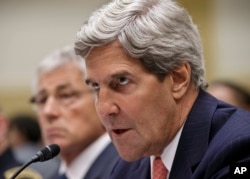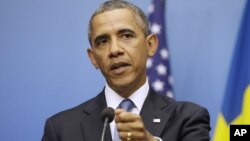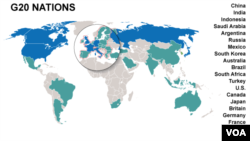The Senate Foreign Relations Committee has approved a resolution giving U.S. President Barack Obama authority to take military action against Syria over its use of chemical weapons on civilians.
The measure will go to the full Senate next week, and must pass there, as well as in the House of Representatives, where it could meet stiff resistance from Republican Party lawmakers.
The 10-7 committee vote came Wednesday as Obama's top foreign policy and defense advisers testified for a second day in Congress, trying to persuade doubtful lawmakers to approve the president's plan for a strike against Syria's military capabilities.
Secretary of State John Kerry spent much of the afternoon speaking to a House of Representatives committee.
"As we debate, the world is watching and the world is wondering, not whether Assad's regime actually did this," Kerry said. "The world is wondering whether the United States of America is going to consent through silence to stand aside while this kind of brutality is allowed to happen without consequence."
The Senate committee approved a plan that would give Obama authority to order limited strikes against Syrian military targets for 60 days. He could extend the window by another 30 days under certain conditions.
The resolution does not authorize the use of ground troops. It states military action must be aimed at deterring and preventing Syria from carrying out future chemical weapons attacks.
Obama says he is convinced that President Assad's government used chemical weapons on civilians in the attack on August 21, which killed more than 1,400 people near Damascus.
Syria denies using chemical weapons, alleging it was the rebels who deployed them.
Congressional leaders have expressed support for action against Syria, but others in Congress remain wary of approving military force, as do most Americans, polls show.
Skeptical Europe
In Sweden Wednesday, Obama carried his case for action to the world. He said a failure to respond to the use of chemical weapons in Damascus would only increase the chance they would be used again.
Obama said the world had long ago determined that using chemical weapons could not be tolerated. Thus, he said, his own credibility is not at stake if there is no action against Syrian President Assad.
“The international community's credibility is on the line,'' he said. “And America and Congress' credibility is on the line, because we give lip service to the notion that these international norms are important.”
The president acknowledged that many Europeans are hesitant to act militarily against Syria because of the incorrect allegations of chemical weapons that led to the war in Iraq.
“I’m not interested in repeating mistakes of us basing decisions on faulty intelligence, but having done a thorough evaluation of the information that is currently available, I can say with high confidence chemical weapons were used,” he said.
Obama is visiting Sweden on his way to the G20 summit in St. Petersburg, Russia. He is expected to continue to argue there for a military response to the chemical weapons attacks.
The Russian government is expected to resist that push. Moscow is one of Syria’s main allies and has resisted international efforts to push for a political solution to Syria’s civil war.
Putin's warning
Russian President Vladimir Putin has said he "doesn't exclude" supporting a U.N. authorization of military force against Syria if there is proof the government there used chemical weapons.
But he warned the U.S. against taking action without U.N. approval.
"Only the U.N. Security Council could sanction the use of force against a sovereign state," Putin told the Associated Press and Russia's state Channel 1 television network. "Any other pretext or method which might be used to justify the use of force against an independent sovereign state is inadmissible and can only be interpreted as an aggression."
Putin urged the U.S. to present "convincing" evidence about chemical weapons to the United Nations.
He said Russia has suspended the delivery of S-300 surface-to-air missile components to Syria, but would reconsider if steps are taken that "violate international norms."
U.N. urges political solution
U.N. Secretary-General Ban Ki-Moon said any use of chemical weapons in Syria is an “outrageous war crime,” and he called on the Security Council to “unite and develop an appropriate response” to bring the perpetrators to justice. However, he said a political solution to the crisis in accordance with the U.N. Charter is the best way to proceed.
U.N. experts are trying to determine whether chemical weapons were used in neighborhoods near Damascus, but there is no word yet when their report will be complete.
The U.N. High Commissioner for Refugees on Wednesday met with officials from Iraq, Jordan, Lebanon and Turkey, to call for more international aid for the two million Syrian refugees who have fled the civil war. The vast majority of them have crossed into Syria’s neighboring countries in the past 12 months, and the U.N. expects the numbers to continue to rise.
The measure will go to the full Senate next week, and must pass there, as well as in the House of Representatives, where it could meet stiff resistance from Republican Party lawmakers.
The 10-7 committee vote came Wednesday as Obama's top foreign policy and defense advisers testified for a second day in Congress, trying to persuade doubtful lawmakers to approve the president's plan for a strike against Syria's military capabilities.
Secretary of State John Kerry spent much of the afternoon speaking to a House of Representatives committee.
"As we debate, the world is watching and the world is wondering, not whether Assad's regime actually did this," Kerry said. "The world is wondering whether the United States of America is going to consent through silence to stand aside while this kind of brutality is allowed to happen without consequence."
The Senate committee approved a plan that would give Obama authority to order limited strikes against Syrian military targets for 60 days. He could extend the window by another 30 days under certain conditions.
The resolution does not authorize the use of ground troops. It states military action must be aimed at deterring and preventing Syria from carrying out future chemical weapons attacks.
Obama says he is convinced that President Assad's government used chemical weapons on civilians in the attack on August 21, which killed more than 1,400 people near Damascus.
Syria denies using chemical weapons, alleging it was the rebels who deployed them.
Congressional leaders have expressed support for action against Syria, but others in Congress remain wary of approving military force, as do most Americans, polls show.
Skeptical Europe
In Sweden Wednesday, Obama carried his case for action to the world. He said a failure to respond to the use of chemical weapons in Damascus would only increase the chance they would be used again.
Obama said the world had long ago determined that using chemical weapons could not be tolerated. Thus, he said, his own credibility is not at stake if there is no action against Syrian President Assad.
“The international community's credibility is on the line,'' he said. “And America and Congress' credibility is on the line, because we give lip service to the notion that these international norms are important.”
The president acknowledged that many Europeans are hesitant to act militarily against Syria because of the incorrect allegations of chemical weapons that led to the war in Iraq.
“I’m not interested in repeating mistakes of us basing decisions on faulty intelligence, but having done a thorough evaluation of the information that is currently available, I can say with high confidence chemical weapons were used,” he said.
Obama is visiting Sweden on his way to the G20 summit in St. Petersburg, Russia. He is expected to continue to argue there for a military response to the chemical weapons attacks.
The Russian government is expected to resist that push. Moscow is one of Syria’s main allies and has resisted international efforts to push for a political solution to Syria’s civil war.
Putin's warning
Russian President Vladimir Putin has said he "doesn't exclude" supporting a U.N. authorization of military force against Syria if there is proof the government there used chemical weapons.
But he warned the U.S. against taking action without U.N. approval.
"Only the U.N. Security Council could sanction the use of force against a sovereign state," Putin told the Associated Press and Russia's state Channel 1 television network. "Any other pretext or method which might be used to justify the use of force against an independent sovereign state is inadmissible and can only be interpreted as an aggression."
Putin urged the U.S. to present "convincing" evidence about chemical weapons to the United Nations.
He said Russia has suspended the delivery of S-300 surface-to-air missile components to Syria, but would reconsider if steps are taken that "violate international norms."
U.N. urges political solution
U.N. Secretary-General Ban Ki-Moon said any use of chemical weapons in Syria is an “outrageous war crime,” and he called on the Security Council to “unite and develop an appropriate response” to bring the perpetrators to justice. However, he said a political solution to the crisis in accordance with the U.N. Charter is the best way to proceed.
U.N. experts are trying to determine whether chemical weapons were used in neighborhoods near Damascus, but there is no word yet when their report will be complete.
The U.N. High Commissioner for Refugees on Wednesday met with officials from Iraq, Jordan, Lebanon and Turkey, to call for more international aid for the two million Syrian refugees who have fled the civil war. The vast majority of them have crossed into Syria’s neighboring countries in the past 12 months, and the U.N. expects the numbers to continue to rise.








